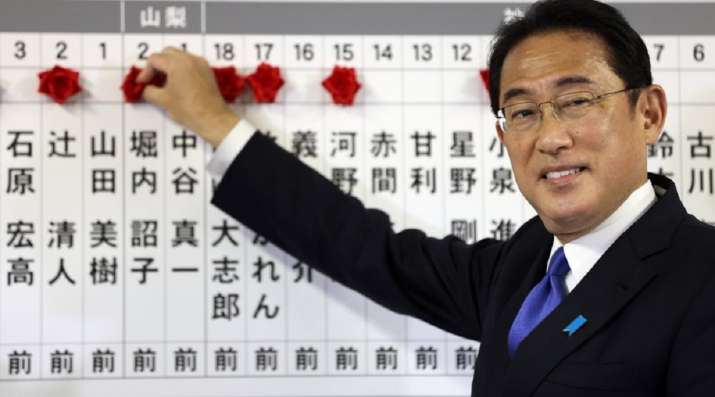
Japan’s Prime Minister Fumio Kishida places a rosette with the names of successful general election candidates on a board at the party headquarters in Tokyo.
Japanese Prime Minister Fumio Kishida’s coalition maintained a comfortable majority in Sunday’s parliamentary election despite losing a few seats as his weeks-old government grapples with a coronavirus-battered economy and regional security challenges.
Kishida’s Liberal Democratic Party and its junior coalition partner Komito together won 293 seats, according to final but not yet official results. This is well above a majority of 233 in the 465-member lower house, the more powerful of Japan’s two-chamber Diet, where they previously held 305 seats.
The LDP lost 15 seats from its pre-election share, but the 261 seats it won is an “absolute majority” – a level that allows the party and its ruling faction to control all parliamentary committees and easily ram through legislation. allows to do.
The LDP’s losses in single constituencies included influential members of the party, such as General Secretary Akira Amari, who had been stunned by the previous bribery scandal. Amari offered to resign, even though he eventually regained his seat in proportional representation.
“The election to the lower house is about choosing the leadership,” Kishida said late Sunday after the ruling coalition secured a majority. “I believe we have got the mandate from the voters.”
Kishida said the results came because of the opposition parties’ strategy of fielding unified candidates in many single-seat electoral districts, but also because of the voters’ decisions of their predecessors over the past four years.
64-year-old Kishida dissolved the lower house just 10 days after taking office on October 4. He had won the leadership race in his ruling party as the party’s conservative leaders saw him as a secure status quo successor to Yoshihide Suga and his influential predecessor. Shinzo Abe.
His strategy of unifying candidates in most single-seat constituencies saw the five opposition parties together lose 10 seats, apparently because the Japanese Community Party was included in their United Front. The largest opposition, the Constitutional Democratic Party of Japan, lost 13 seats to 96, and the Communists lost two seats, backing out of 12.
A big winner was the right-wing Ishin, or Japan Innovation Party, which nearly quadrupled its seats to 41, becoming the third largest party. Experts say that despite the party’s past stance close to the LDP, increasing criticism from both the ruling and opposition factions satisfied voters who wanted a change from the LDP, but found the opposition faction uncomfortable.
Kishida’s immediate task is to rally support for a party weakened by Suga’s perceived high-end approach to pandemic measures and his insistence on holding the Tokyo Olympics despite widespread protests due to a high number of coronavirus cases, which have since fell rapidly.
Kishida repeatedly emphasized his determination to listen to the people and address criticism that the nine years under Suga and Shinzo Abe had fueled corruption, subdued bureaucrats and stifled opposing opinion.
The campaign is largely focused on COVID-19 response measures and reviving the economy.
While the ruling party emphasized the importance of having a strong military amid concerns over China’s growing influence and North Korea’s missile and nuclear threat, opposition parties focused on issues of diversity and emphasized gender equality.
Opposition leaders complain that recent LDP governments have widened the gap between rich and poor, have not supported the economy during the pandemic, and stifled gender equality and diversity initiatives. Japan is ranked 120th this year in the World Economic Forum’s gender gap ranking of 156 countries.
After a brief rule by Japan’s now-defunct centre-left Democratic Party in 2009–2012, the opposition has long struggled to win enough votes to form a government, as they were able to present a grand vision for the country. are not.
On the economy, Kishida has emphasized growth by raising income, while opposition groups focus more on redistributing wealth and calling for cash payments to low-income families affected by the pandemic.
During the campaign, Kishida promised to promote development and “distribute its fruits” as income to the people.
Kishida said late Sunday that he plans to reappoint the same members in his post-election cabinet to speed up work on a supplementary budget by the end of this year to help support people and businesses affected. to finance an economic package. Epidemic.
“I will take concrete steps to achieve my policies as soon as possible,” Kishida said. “I need to move on quickly.”
Before working on them, Kishida said he was on his way to Glasgow to attend the COP26 summit on Tuesday. “This is a global issue for all mankind, and Japan must take our responsibility,” he said.
The LDP opposes legislation guaranteeing equality for sexual minorities and allowing a different surname for married couples.
Despite a 2018 law promoting gender equality in elections, only 17% of the 1,051 candidates were women, which is toothless because there are no penalties. The share of women in parliament is about 10%, a situation gender rights experts call a “democracy without women”.
Some voters had little hope of change from Kishida’s government.
Shinji Asada, 44, said he likened COVID-19 measures to electing a candidate hoping to change leadership, as he felt the ruling party lacked explanation and transparency on its pandemic measures. He said that despite Kishida’s promise to be more aware of the voices of the people, “I thought nothing would change after seeing his cabinet (under him),” whose positions went largely to party factions. who voted for him.
(Except the title, Indiatvnews.com has not edited the copy)
.